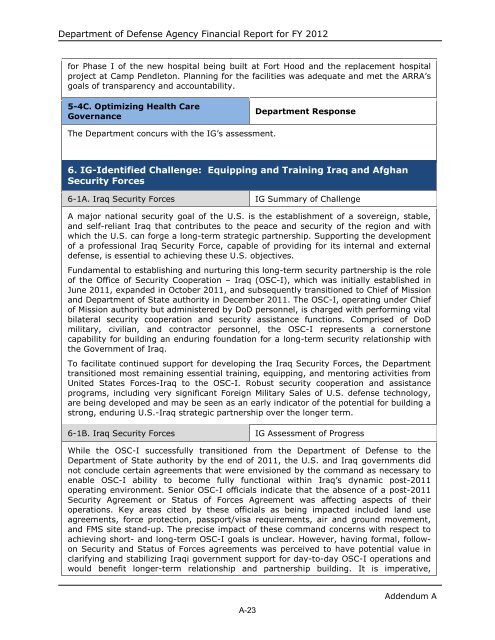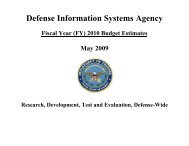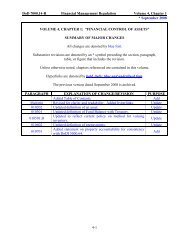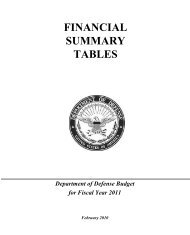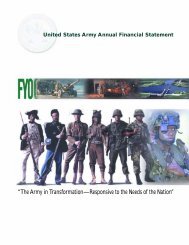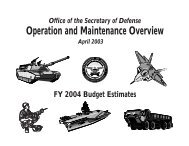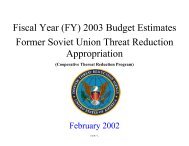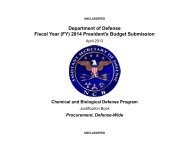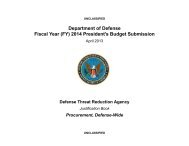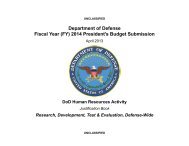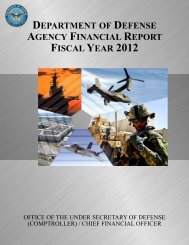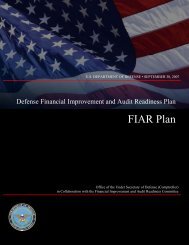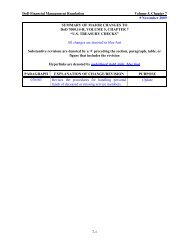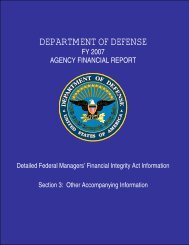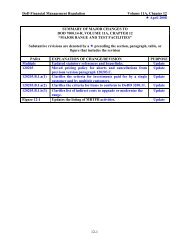department of defense agency financial report fiscal year 2012
department of defense agency financial report fiscal year 2012
department of defense agency financial report fiscal year 2012
You also want an ePaper? Increase the reach of your titles
YUMPU automatically turns print PDFs into web optimized ePapers that Google loves.
Department <strong>of</strong> Defense Agency Financial Report for FY <strong>2012</strong><br />
for Phase I <strong>of</strong> the new hospital being built at Fort Hood and the replacement hospital<br />
project at Camp Pendleton. Planning for the facilities was adequate and met the ARRA’s<br />
goals <strong>of</strong> transparency and accountability.<br />
5-4C. Optimizing Health Care<br />
Governance<br />
The Department concurs with the IG’s assessment.<br />
A-23<br />
Department Response<br />
6. IG-Identified Challenge: Equipping and Training Iraq and Afghan<br />
Security Forces<br />
6-1A. Iraq Security Forces IG Summary <strong>of</strong> Challenge<br />
A major national security goal <strong>of</strong> the U.S. is the establishment <strong>of</strong> a sovereign, stable,<br />
and self-reliant Iraq that contributes to the peace and security <strong>of</strong> the region and with<br />
which the U.S. can forge a long-term strategic partnership. Supporting the development<br />
<strong>of</strong> a pr<strong>of</strong>essional Iraq Security Force, capable <strong>of</strong> providing for its internal and external<br />
<strong>defense</strong>, is essential to achieving these U.S. objectives.<br />
Fundamental to establishing and nurturing this long-term security partnership is the role<br />
<strong>of</strong> the Office <strong>of</strong> Security Cooperation – Iraq (OSC-I), which was initially established in<br />
June 2011, expanded in October 2011, and subsequently transitioned to Chief <strong>of</strong> Mission<br />
and Department <strong>of</strong> State authority in December 2011. The OSC-I, operating under Chief<br />
<strong>of</strong> Mission authority but administered by DoD personnel, is charged with performing vital<br />
bilateral security cooperation and security assistance functions. Comprised <strong>of</strong> DoD<br />
military, civilian, and contractor personnel, the OSC-I represents a cornerstone<br />
capability for building an enduring foundation for a long-term security relationship with<br />
the Government <strong>of</strong> Iraq.<br />
To facilitate continued support for developing the Iraq Security Forces, the Department<br />
transitioned most remaining essential training, equipping, and mentoring activities from<br />
United States Forces-Iraq to the OSC-I. Robust security cooperation and assistance<br />
programs, including very significant Foreign Military Sales <strong>of</strong> U.S. <strong>defense</strong> technology,<br />
are being developed and may be seen as an early indicator <strong>of</strong> the potential for building a<br />
strong, enduring U.S.-Iraq strategic partnership over the longer term.<br />
6-1B. Iraq Security Forces IG Assessment <strong>of</strong> Progress<br />
While the OSC-I successfully transitioned from the Department <strong>of</strong> Defense to the<br />
Department <strong>of</strong> State authority by the end <strong>of</strong> 2011, the U.S. and Iraq governments did<br />
not conclude certain agreements that were envisioned by the command as necessary to<br />
enable OSC-I ability to become fully functional within Iraq’s dynamic post-2011<br />
operating environment. Senior OSC-I <strong>of</strong>ficials indicate that the absence <strong>of</strong> a post-2011<br />
Security Agreement or Status <strong>of</strong> Forces Agreement was affecting aspects <strong>of</strong> their<br />
operations. Key areas cited by these <strong>of</strong>ficials as being impacted included land use<br />
agreements, force protection, passport/visa requirements, air and ground movement,<br />
and FMS site stand-up. The precise impact <strong>of</strong> these command concerns with respect to<br />
achieving short- and long-term OSC-I goals is unclear. However, having formal, followon<br />
Security and Status <strong>of</strong> Forces agreements was perceived to have potential value in<br />
clarifying and stabilizing Iraqi government support for day-to-day OSC-I operations and<br />
would benefit longer-term relationship and partnership building. It is imperative,<br />
Addendum A


